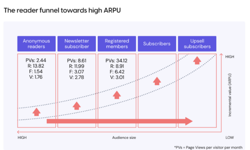
One of the classic struggles for publishers online is getting broadly distributed by search engines without giving content away, or simply having it ad supported. In print, we typically charge for the content, as well as selling ad space. Why can’t we have our cake and eat it… just on the internet?
Traditional paywalls have been problematic for search engine optimisation (SEO) and search engine rankings. The paywalls didn’t allow Google web crawlers access to our websites to make an index of our content. And we could only get into the Google results if Google could read our content.
Google is the main player in town when it comes to natural web distribution. Others exist of course, like Bing and the rather fabulous Duckduckgo but their size doesn’t move the dial as much.
To maintain their grip on the web, Google released a feature – known as “First Click Free” – which gave publishers the option to allow Google access to paywalled content. It showed page previews in search results of paywalled content and sent more happy customers our way. However, there was a catch.
In return for showing paywalled content in search results, the publishers had to make concessions. Google mandated the minimum allocation of articles per month publishers must show. When searchers clicked from Google to an article that would normally be premium content, the article appeared as though it was free.
Over time, publishers became more unhappy with Google’s forced trade conditions. Google updated the service to allow greater flexibility and renamed it “Flexible Sampling” to reflect its more dynamic nature. This allowed the publisher to define how many pages, or articles, they wished to make available to searchers who click the results, over a fixed period of time. Some Full Fat Things clients allow as few as two articles per twenty eight days. The result? In some cases this has trebled traffic, which shows the raw growth that can be achieved by getting your paywalled content into the Google index.
What can you do with these additional eyeballs?
Whilst it is true that a small section of paid content is now available to select customers, the way to think about this is as a marketing exercise. Many brands launch something similar to ‘£12 for 12 weeks’ or free trials to capture new subscribers. Flexible sampling is a permanent marketing campaign where we give away that initial access to get more eyes on content.
When we do get those additional eyes on our content…
- We do it without extra paid advertising spend.
- We get to push the full attention of our marketing at these special visitors.
- We can try to grab an email address.
- We can offer them a subscription offer, just like we would when we offer them ‘£12 for 12 weeks’ or a free trial. We still haven’t paid to acquire the lead. This is just magic isn’t it?
Let's swap “Marketing team” with Watson in the following sentence...
“Come, Watson, come!” he cried. “The game is afoot. Not a word! Into your clothes and come!”
This marketing method is almost free. Paid ads on the internet are getting more competitive every year. We are on to a winner.
The pay per click market is maturing, increasing the cost per lead, whereas search engine optimisation lasts a long time and has no continual fee. You could even find that you don’t need to spend on Google PPC campaigns anymore.
If you do spend on Google PPC, get the very best ROI by allocating budget to remarketing campaigns. Specifically retarget the readers captured through Google Flexible Sampling and convert them to subscribers. Hit them with messages multiple times. We all know in marketing that we need to reinforce our message to secure the sale.
If you have multiple products, start with one to see whether you can grow your traffic footprint and lead numbers for subscriptions. You don’t have to put all content into Flexible Sampling. Some publishers choose to put selected content into Flexible Sampling based on a content type, for instance all reviews or opinion pieces, or a section such as sport or business. This allows a degree of control on which areas you wish to grow.
If you have a paywall and run any marketing campaigns to sell access to your content, this will deliver results. Make sure your analytics and tracking tools are set up correctly, ensure your paywall can allow Google and the Flexible Sampling traffic through, and then watch the growth.
Arm your marketing teams with a little bit of tech, and see how dangerous they can be.

About us
With a combined experience of over 50 years in the publishing industry, we’ve worked with names like Future, The Economist, Which?, Wiley and Wolters Kluwer on both B2B and B2C products. We can help take raw print output and create digital products with real revenue, often with minimal additional production inside the publisher.
Email: stew@fullfatthings.com
Tel: 020 7099 3875
LinkedIn: www.linkedin.com/company/full-fat-things
Twitter: @fullfatthings
Facebook: www.facebook.com/fullfatthings










